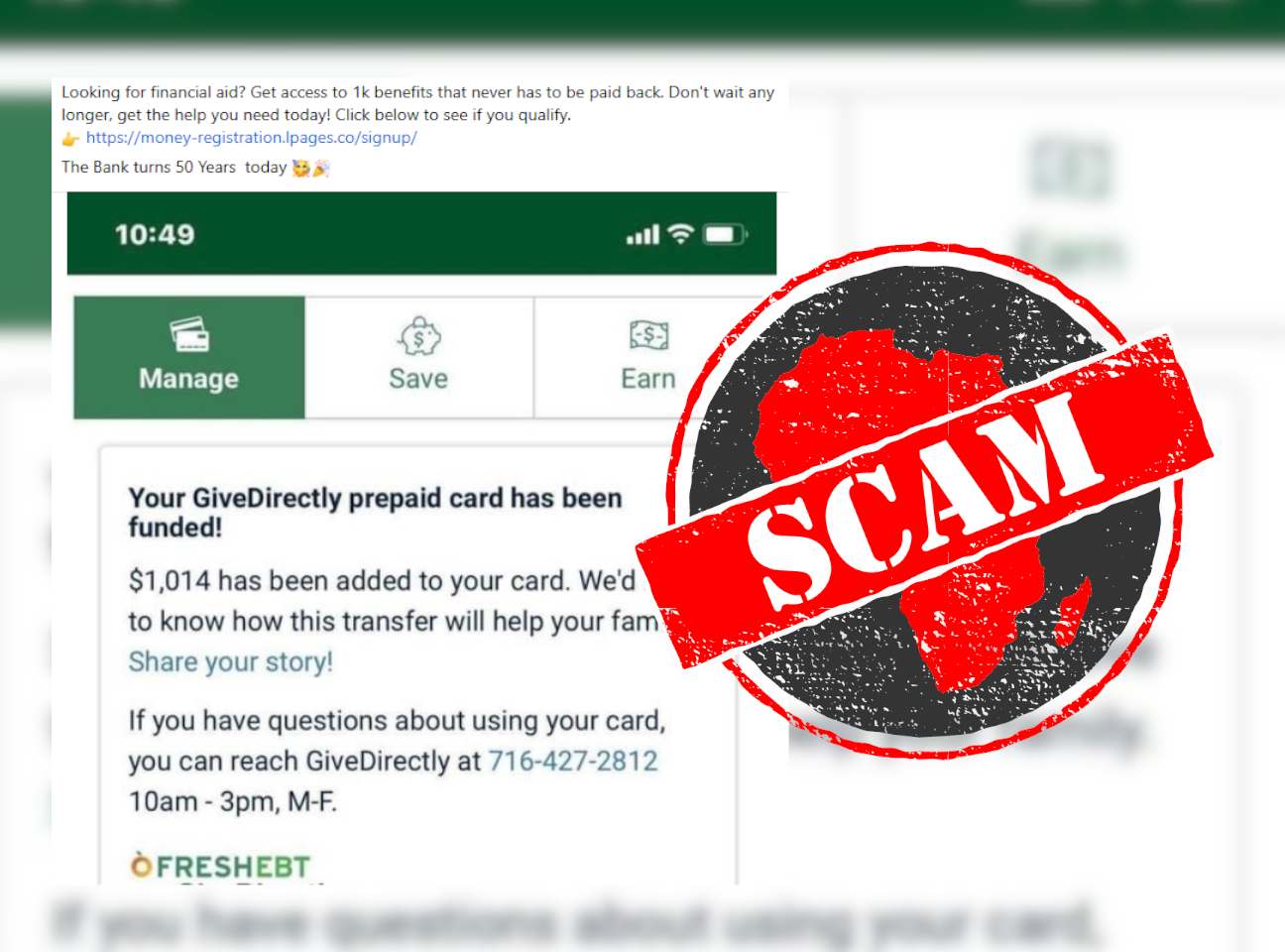IN SHORT: If it seems too good to be true, it probably is. The widespread message offering US1,000 for free is just another version of the increasingly common Facebook post editing scam. Here’s how to spot it.
“Looking for financial aid?” asks a message posted on Facebook community pages across the world. “Get access to 1k benefits that never has to be paid back. Don't wait any longer, get the help you need today! Click below to see if you qualify.”
It then links to a basic website created with Leadpages.
The message includes what seems to be a screenshot of proof of payment. It reads: “Your GiveDirectly prepaid card has been funded! $1,014 has been added to your card.”
But the message is a scam. It’s part of what we’ve called the Facebook post editing scam, which we’ve been investigating for months.

Innocent message edited and replaced with scam
Here’s how the scam works.
An innocent but attention-grabbing message is posted on a Facebook community page. These are a few of the messages (errors included) used in this particular version of the scam:
- Today is my birthday, I know I'm ugly but no one ever blessing me!! (See here.)
- Heres a picture of my grandma’s new pattern. It's simple, but She made it with all herheart. (See here, here, here, here and here.)
- This is the most recent picture of my son Andrew Bucklandon his first day of school, he left yesterday morning for school and he never came back. (See here, here and here.)
The message has no links or contact details. It includes one or more photos. But the photos are unrelated to the message, because the message is false.
The message doesn’t seem to be a scam, so it’s passed by moderators and posted on the page.
The message is interesting – it appeals to the heart, or evokes fear – so it’s shared by others. Many versions encourage sharing by asking users to “please help” or “please bump this post”.
The message is then edited. The photos are removed and the text replaced.

The resulting scam message is also false. It could offer free money from a banking service, free dental care, or an offer to buy a house.
But the scam messages will always include a link to a website, with an encouragement to click something.
Here the actual scam begins.
It’s often difficult to work out exactly how a scam works.
But most Facebook post editing scams try to get users to download an app. This is likely to install malware on their devices. The malware could then steal valuable personal information such as credit card details. It could even take over the person’s online identity.
How to protect yourself from online scams
To see the edit history of any Facebook post, click the three dots at its top right.
Find out more about the Facebook post editing scam – and how to protect yourself against it – in our extensive earlier reporting:
- Facebook users from Africa say Tennessee prisoner an active serial killer in US cities? No, weird warning a hoax
- Facebook fraudsters up to new tricks: Go2Bank scam spread by editing ordinary posts
- Girl in blue ‘missing’ across the USA? No, just another Facebook scam
- Serial killer, missing child, missing dog? Beware the new Facebook post editing scam
- ‘Download App, Sign Up and Get Rewarded’? No! Beware new Facebook post editing scam
- No, community nappy drive fake. Don’t fall for an increasingly popular Facebook scam
- Bear 1, vehicle 0? No, story of bear locked in car just step one in Facebook scammers’ new trick
- ‘I know I’m ugly’? Sad birthday message just another scam
Our guide to Facebook scams and how to spot them gives more advice on keeping yourself safe from online predators.
Republish our content for free
For publishers: what to do if your post is rated false
A fact-checker has rated your Facebook or Instagram post as “false”, “altered”, “partly false” or “missing context”. This could have serious consequences. What do you do?
Click on our guide for the steps you should follow.
Publishers guideAfrica Check teams up with Facebook
Africa Check is a partner in Meta's third-party fact-checking programme to help stop the spread of false information on social media.
The content we rate as “false” will be downgraded on Facebook and Instagram. This means fewer people will see it.
You can also help identify false information on Facebook. This guide explains how.




Add new comment